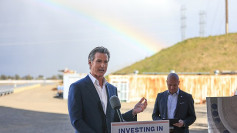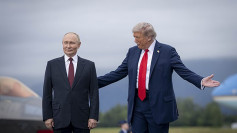In a rally that captured national attention, former President Donald Trump ignited a firestorm of controversy in Conway, South Carolina, by asserting that the Biden administration is effectively being orchestrated by former President Barack Obama. This claim, made before a fervent crowd of supporters, has since reverberated through political circles and the wider public, sparking a mix of skepticism, amusement, and concern.
According to Trump, the visible struggles of President Joe Biden, particularly his occasional navigational mishaps on stage, are symptomatic of a deeper issue-his purported lack of mental fitness to govern. Trump suggested that this perceived vulnerability has allowed Obama to assume a shadowy, yet pivotal role in directing national policy and decision-making from behind the scenes.
In his speech, Trump, known for his flair for provocation, deliberately emphasized Obama's middle name, "Hussein," a tactic that drew audible reactions from his audience and served to underscore his insinuation of Obama's undue influence. "I don't think [Biden] knows what the hell he's doing anyways," Trump declared. "But every time I interchange Barack Hussein ... they say he doesn't know who the president is. He thinks it's Barack Obama. I say no, no, but I think Barack Obama has a lot to do with the running of the country right now, and we can't let that happen."
The response to Trump's allegations was swift and varied. On social platforms like X, formerly known as Twitter, users were quick to dissect his remarks, with some expressing disbelief and others humor at the enduring impact of Obama's legacy on Trump. One user quipped, "Obama roasted this man one time over ten years ago, and he's been living in Trump's head rent-free ever since."
Further fueling the controversy, Trump and his Republican allies have leveraged a report by Special Counsel Robert Hur to cast doubts on Biden's capacity to serve. The report, which paints Biden as an "elderly man with a poor memory," has been seized upon as evidence of his unfitness for office. Critics, however, question the report's relevance and timing, suggesting it is part of a broader strategy to undermine confidence in the current administration.
The implications of Trump's assertions extend far beyond the immediate reactions they provoke. They tap into ongoing debates about the nature of presidential power, the influence of political advisors, and the public's perception of leadership competency. Moreover, these claims reflect a deeper polarization within American politics, where conspiracy theories and partisan narratives often overshadow empirical evidence and reasoned debate.
As the political landscape continues to evolve, the impact of such statements on public discourse and the fabric of American democracy remains to be seen. What is clear, however, is that the echoes of past presidencies and the shadows they cast are potent forces in the ongoing narrative of American politics, capable of shaping not only how leaders are viewed but also how they are remembered.






